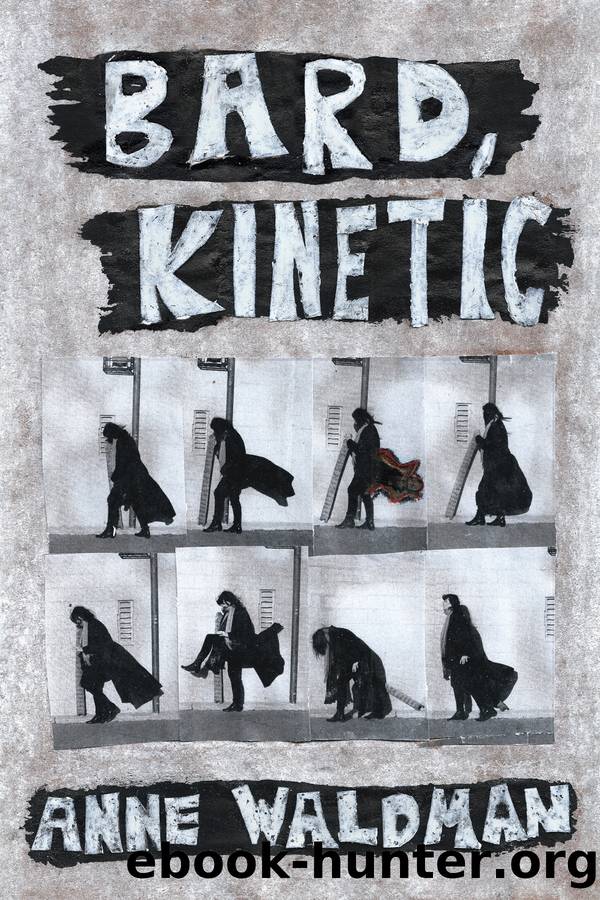Bard, Kinetic by Anne Waldman

Author:Anne Waldman
Language: eng
Format: epub
Publisher: Coffee House Press
This image of being on the lip . . . similar to the liminal quality of Agambenâs notion of the state of being contemporary and gazing into darkness, of being caught between two realities, felt useful to a poem of cosmic investigation. But the message is donât get paralyzed. Not to be stuck but rather awake to the âalready happenedâ and also ânot yetââthe mystery of our condition in human-time-space dimension. Poetry can lift you out for a moment to track and experience the journey.
The poet standing by her word, which is in a sense all we have in this liminal space of âalreadyâ and ânot yetââstanding by the word, the utterance, the poetâs role as in âvocalizingâârelates to the notion of âprojective verse,â emerging in the last century through the poetics of Olson and others. Olson speaks of the âkinetics of the thingâ and âone thought following instanter on the other.â Thus a kind of mind grammar or intervention that reflects the rhythm and often interrupted thinking, disjunctive and staccato (the dérèglement des sens perhaps), of the imagination. Wanting poems as âcultural interventionsâ to come into public space vocally, on a trajectory of associations, as well as intentionality. There are ideas in this dance of the intellect that come to form precisely through a particular mode of vocalization.
We do not think in complete sentences, and I would say our minds are often at ten various points simultaneously, borrowing from Buddhism the notion of the ten directions of space, which also relates to the necessary measure of our compassion toward others. Thereâs spontaneity in performance involving mantra, blues, and ritual rantâas in Ginsbergâs âPentagon Exorcism,â meant to bring the Pentagon âdownâ metaphoricallyâand that spontaneous form becomes a fierce example of the need to manifest vocally the urgency for âchanging the frequencyâ of our various solidified realities, in order to reinvent and claim them for public âgood.â
The notion of âstate of mindâ coming to be as powerful as a ânation state.â In playing with this phrase in an agitprop performance on Wall Street during a demonstration in the beginning years of the war in Iraq, I was able to invoke the witchery of the wrathful female Rangda figure of Balinese origin, who often ends the night by leading the participants into the charnel ground, or cemetery, on the edge of town. Rangda has enormous bulging eyes, pendulous breasts, and long fingernails that claw at the fabric of the âstate.â
Much of my practice, operating in the temporary autonomous zone of the Outrider tradition, goes back to the sense of the word worker, the minstrel, the bard, the shaman. The poems are âmodal structures.â Working within the soundings of Sprechstimme, invokes tone poems of Alban Berg, opera libretti, and the like. âPieces of an Hour,â for John Cage, in its entirety would run an hour, with some gap for silence and drawn-out phrases. I embody âvoiceâ over a kind of fixed âidentity.â Its look on the page is one of shape-shifting matrixes.
Translation, of course, is a first ingredient of how a poem will work outside.
Download
This site does not store any files on its server. We only index and link to content provided by other sites. Please contact the content providers to delete copyright contents if any and email us, we'll remove relevant links or contents immediately.
On the Front Line with the Women Who Fight Back by Stacey Dooley(4317)
The Lonely City by Olivia Laing(4128)
The Rules Do Not Apply by Ariel Levy(3915)
Bluets by Maggie Nelson(3724)
The Confidence Code by Katty Kay(3576)
Three Women by Lisa Taddeo(2925)
A Woman Makes a Plan by Maye Musk(2842)
Inferior by Angela Saini(2838)
Pledged by Alexandra Robbins(2797)
Not a Diet Book by James Smith(2742)
Confessions of a Video Vixen by Karrine Steffans(2681)
Wild Words from Wild Women by Stephens Autumn(2599)
Nice Girls Don't Get the Corner Office by Lois P. Frankel(2598)
Brave by Rose McGowan(2508)
The Girl in the Spider's Web: A Lisbeth Salander novel, continuing Stieg Larsson's Millennium Series by Lagercrantz David(2384)
The Clitoral Truth: The Secret World at Your Fingertips by Rebecca Chalker(2248)
Why I Am Not a Feminist by Jessa Crispin(2245)
Women & Power by Mary Beard(2229)
Women on Top by Nancy Friday(2131)
